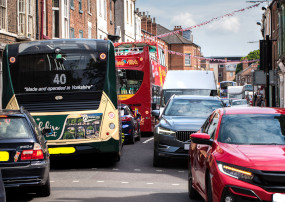
A trial that seeks to tackle congestion and improve air quality on Gillygate will be considered at a decision session this week (Thursday 5 December).
At the meeting, the Executive Member for Transport will review options and decide whether or not to carry out a trial in 2025 to understand how changing the traffic signal sequencing would affect air quality in the area.
The recommended option proposes trialling changes to the traffic light sequencing to significantly reduce stationary traffic on the street which has the worst air quality in York.
If approved, the trial will be monitored and adapted if there are major issues. This will include reviewing the impact on buses and emergency vehicles. Should they be needed, adjustments to the timings would be made during the trial to seek to minimise any impacts on these groups.
It is proposed that the trial would be for 12 months so that the air quality data can be effectively compared with previous years.
Councillor Kate Ravilious, Executive Member for Transport at City of York Council said:
In Our Big Transport Conversation, Gillygate was identified by residents and stakeholders as an area where people wanted to see change.
“We share that desire for change. Not only is the traffic there frustrating for those queueing but the air pollution produced by that traffic is unhealthy for those living in and visiting the area and discourages people from walking, wheeling, cycling and visiting the street. Standing traffic in Gillygate has a greater impact on poor air quality due to the narrow canyon-like shape of the street, with polluted air trapped for longer than on other streets.
“I am grateful to Gillygate Area Air Quality Action Group and the York Civic Trust for working with us as we explore the options included in the report. We all want to better understand any wider impacts, how we can best address this problem and hopefully find a long-term solution that will noticeably improve air quality and tackle congestion. Achieving this would help us to deliver on the Local Transport Strategy priorities that York is a healthier, more sustainable and better-connected city.”
Councillor Jenny Kent, Executive Member for Environment and Climate Emergency said:
Doing nothing is not an option. The health of people visiting, living and working on Gillygate is suffering as a result of the poor air quality, which breaches national standards. We know that vehicle traffic is a major contributor to air pollution on the street and we are committed to addressing the problem and putting the health and wellbeing of people first.
“Through our Local Transport Strategy, we are looking at ways to improve air quality and tackle congestion. By working with partners to improve air quality here we are hoping it will bring benefits to people’s health, local businesses, as well as the environment.”
Tony May, chair of York Civic Trust’s Environment Committee, said
Gillygate has air pollution levels which have exceeded government thresholds for many years, and it is clear that much of that pollution is caused by traffic. We are pleased to have been able to support the Gillygate Area Air Quality Action Group, and the Council, in developing this trial and in designing the proposed surveys.
“If approved, we look forward to seeing the early results from the trial, which we hope will be an exemplar for what can be achieved across the city through the Council’s Movement and Place Plan”.
In 2023 the council, working with Gillygate Area Air Quality Action Group, held a 2 week trial. This was successful in reducing queueing traffic on Gillygate, but there were some concerns around longer queues on Lord Mayor’s Walk, and to a lesser extent, Clarence Street. If the Executive Member agrees to a trial, the findings and timings from 2023 would be used to shape this latest trial in the area. In addition, over the longer term, any increased traffic queues on surrounding streets are anticipated to dissipate, as people adapt how they travel.
The proposed trial for 2025 would look to ensure traffic will access Gillygate and flow through it with minimal stopping.
Read the Decision Session, Executive Member for Transport, Thursday 5 December 2024 10.00am report and watch the meeting online.


